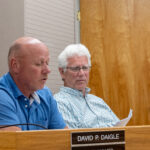By Scott Mitchell Johnson
Staff Writer
PRESQUE ISLE — The Maine Board of Pesticides Control is looking for the public’s input on pesticide policy, board activities and rule-making initiatives.
An open forum will be held Thursday, July 26 from 6-7 p.m., while a rule-making public information gathering work session is scheduled for Friday, July 27 at 8:30 a.m. Both meetings will be held at the Maine Potato Board office, located at 744 Main St. in Presque Isle.
Periodically, the Maine Board of Pesticides Control invites the public to an open meeting, without any agenda, where all matters relating to pesticides can be discussed. At the open forum, discussion on pesticide policy and board activities is encouraged.
Before the Board initiates formal rule making and the public hearing process on the rules listed below, public information gathering work sessions are held, where the public is invited to offer informal comment on the proposed changes. The Board is also accepting written comments until Aug. 3. Comments can be mailed to Henry Jennings, Director, Board of Pesticides Control, 28 State House Station, Augusta, ME 04333-0028, or send e-mail to henry.jennings@maine.gov.
Among the Board rules under consideration include:
• Chapter 10 — Definitions and Terms:
1) Amend the definition of “Spray Contracting Firm” to clarify the legal interpretation of a corporation and exempt companies that subcontract pesticide application work from the need for a Spray Contracting Firm License.
2) Create a definition for “Low Risk Pesticides” so that landlords may provide certain pesticides to their tenants without the requirement of a general use pesticide dealer’s license.
3) Amend the definition of “Custom Application” to exclude the use of antimicrobial copper hardware.
4) Create a definition of “Government Employee,” consistent with the interpretation from the Office of the Attorney General, to clarify when such employees are required to possess an applicator’s license and which employees are exempt from paying fees.
5) Amend the definition of “Commercial Applicator” to clarify that adults other than parents or guardians may apply insect repellents to children, and others who aren’t able to do it themselves, without the need for a pesticide applicator’s license.
• Chapter 21 — Pesticide Container Disposal and Storage: The Legislature repealed the container deposit mandate with the expectation that the Board would repeal the requirement in rule.
• Chapter 27 — Standards for Pesticide Application and Public Notification in Schools:
1) Incorporate recommendations listed below that the Board supports from the Report to the Joint Standing Committee on Agriculture, Conservation and Forestry To Enhance the Use of Integrated Pest Management on School Grounds.
a. Strengthen the role of the IPM Coordinator.
b. Reduce and consolidate the school pesticide record-keeping requirements.
c. Eliminate the beginning-of-year notification requirement.
d. Address communication weaknesses between contractors and IPM coordinators.
e. Provide for a way to maintain accurate contact information for school IPM coordinators.
2) Add exemptions for high school agricultural and horticultural programs from certain requirements of Chapter 27, and put into place alternate requirements to protect students.
3) Align the outdoor sign requirement with Chapter 28, and adjust some typos and ambiguity.







